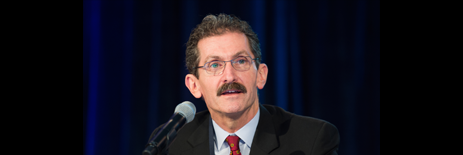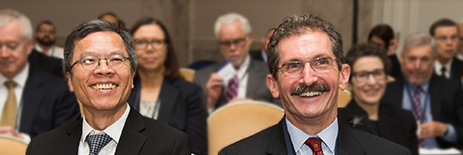Dr. Peter J. Katsufrakis Appointed President of National Board of Medical Examiners (NBME)

Dr. Peter J. Katsufrakis Appointed President of National Board of Medical Examiners (NBME)
PHILADELPHIA, PA January 30, 2017 -- Following a national search, the Executive Board of the National Board of Medical Examiners has selected Peter J. Katsufrakis, MD, MBA to lead the NBME as its next president. The NBME, which creates and administers a wide range of health professions assessments and assessment tools, is best known as the creator and co-sponsor of the United States Medical Licensing Examination® (USMLE®), which all medical doctors must pass to be licensed to practice in the U.S. The appointment of Dr. Katsufrakis as president will be effective January 30, 2017 upon the retirement of Donald E. Melnick, MD, who has led the NBME since 2000.
"I am honored to follow Don Melnick as president of the NBME," comments Dr. Katsufrakis. "I feel as though I am inheriting a well-tended orchard, where Don has tilled and prepared the soil that will allow us to grow in many directions. I am eager to take the great work our staff has done serving the public and apply that expertise as we strive to expand our offerings to other health professions, other skills and competencies, and other parts of the globe."
Dr. Katsufrakis currently serves as senior vice president of Assessment Programs at the NBME and is recognized nationally in the medical education and assessment community, both for his work at the NBME and in past roles advancing professionalism, HIV education, clinical training, and medical education administration. Prior to joining the NBME, Dr. Katsufrakis’s positions included associate dean for student affairs and associate professor of clinical family medicine at the Keck School of Medicine at the University of Southern California, where he received several teaching and outstanding service awards for his work. He also served more recently as clinical associate professor of family and community medicine, at Sidney Kimmel Medical College at Thomas Jefferson University.
After being awarded his medical degree from the University of California, San Diego, Dr. Katsufrakis completed an internship and residency in family medicine at Santa Monica Hospital. He began his training during the early years of the HIV epidemic, which influenced his career path and his interest in education. He sought leadership roles soon after residency, working to train faculty and residents to care for HIV patients as director of clinical training at the AIDS Education and Training Center of the University of Southern California. His demonstration of ability and leadership in education led to service in medical administration and other positions at the Keck School of Medicine, including his role as interim associate dean for administration. While engaged in this work, he broadened his expertise by earning an MBA from USC’s Marshall School of Business. Throughout his time at USC, Dr. Katsufrakis loved working with students, issues of professionalism, and other matters he deemed most important to the mission of protecting the public.
These interests drew him to the NBME in 2007, when he joined the staff to direct a group working on assessment of professionalism. Dr. Katsufrakis was later tasked with helping to lead the response to recommendations from the Committee to Evaluate the USMLE Program. He made significant contributions to changes that have resulted in improved alignment between the USMLE and the competencies required to obtain a license to practice medicine. Since 2012, he has served as senior vice president of the Assessment Programs division of the NBME, responsible for program planning, budgeting, customer and governance interface, and continuous program improvement.
Dr. Katsufrakis is licensed to practice medicine in Pennsylvania and is a diplomate of the American Board of Family Medicine. He is a member of the American Academy of Family Physicians and has served many organizations as a member, including the International AIDS Society, the American Academy of HIV Medicine, and the Association of American Medical Colleges Group on Student Affairs in many roles on committees and task forces.
Dr. Katsufrakis, his partner Shathi Abdulrab, and Lucy, their Chesapeake Bay retriever, live in the historic Society Hill section of Philadelphia, a short walk from Independence Hall.

A Thriving Career
The windows in Dr. Peter Katsufrakis's office are striped with green cacti. The thriving plants extend from the windowsill to the ceiling in a well-tended parade. "My father gave me the first one when I went off to medical school," explains Peter. "Over the years I’ve taken cuttings and rooted more plants. When I moved to Philadelphia from California eight years ago, several cuttings came with me, and the result is what you see here."
The current forest of green is an apt metaphor for a career that has taken Peter from those first days of medical school to a residency in family practice, then to years leading the HIV/AIDS Education Center at USC, to associate dean for student affairs at the Keck School of Medicine, to his cross-country move to lead an assessment of professionalism project and eventually oversee all Assessment Programs at NBME, and finally to his new role – as president of the Board.
"I am humbled and honored to have been chosen to lead the Board in its mission to protect the health of the public, but I also feel well-prepared," comments Peter. "I believe Don Melnick’s 16 years of service as president have tilled and tended the ground in ways which are allowing us to grow in many new directions. I’m excited about the new assessments, new collaborations, and new opportunities that lie ahead to provide education services to our many constituents – both in the United States and across the globe."
Peter is the first doctor of family medicine to serve as president in NBME’s 101-year history. "Family medicine appealed to me because it embodied the best of various specialties. It made me a well-rounded generalist ready to address a wide range of issues, but also taught me how to seek and involve specialty expertise as needed – a good model for my new role with the NBME!"
In some respects, Peter’s current work comes full circle from his first leadership role educating medical personnel about treating patients stricken with AIDS, at a time when little was known about the virus beyond its devastating effects. "I resonated with the needs of that community," remembers Peter. "There was so much to be learned, and so much to be taught. But it was fascinating to be an expert in a narrow field of medicine, and to be on the cutting edge of a field that was changing month by month. Today’s challenges are different, but I feel the same excitement about the opportunity to develop new tools and assessments that protect the public at a time when medical school curricula are undergoing major change, and the landscape of care is evolving so rapidly. It’s satisfying and necessary work, and I’m eager to get to it!"
